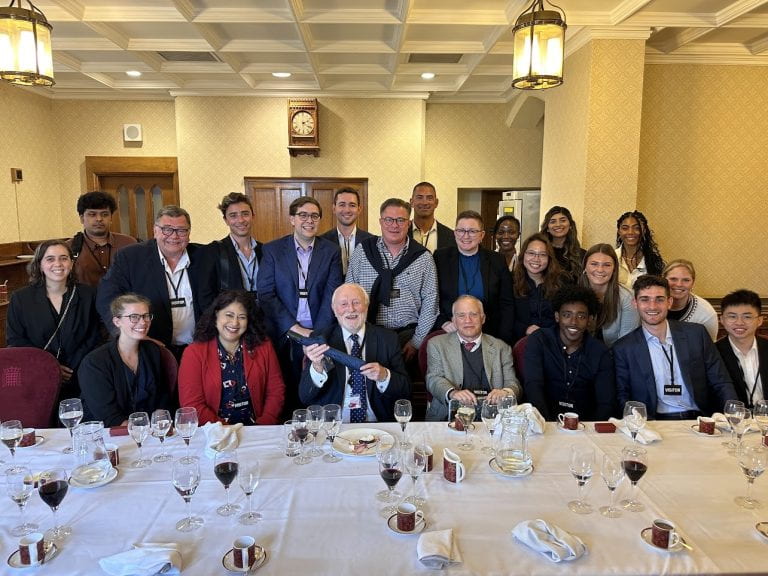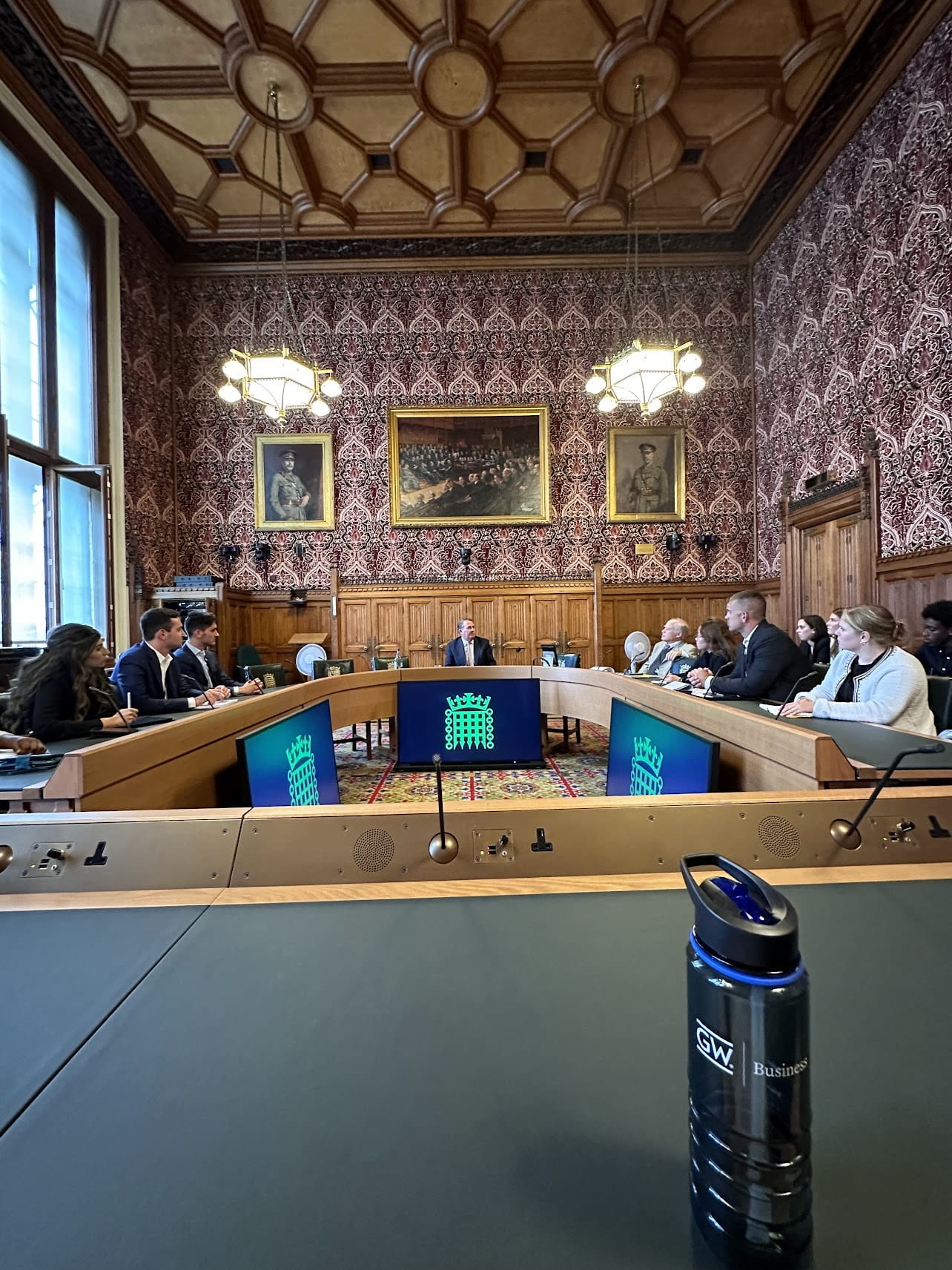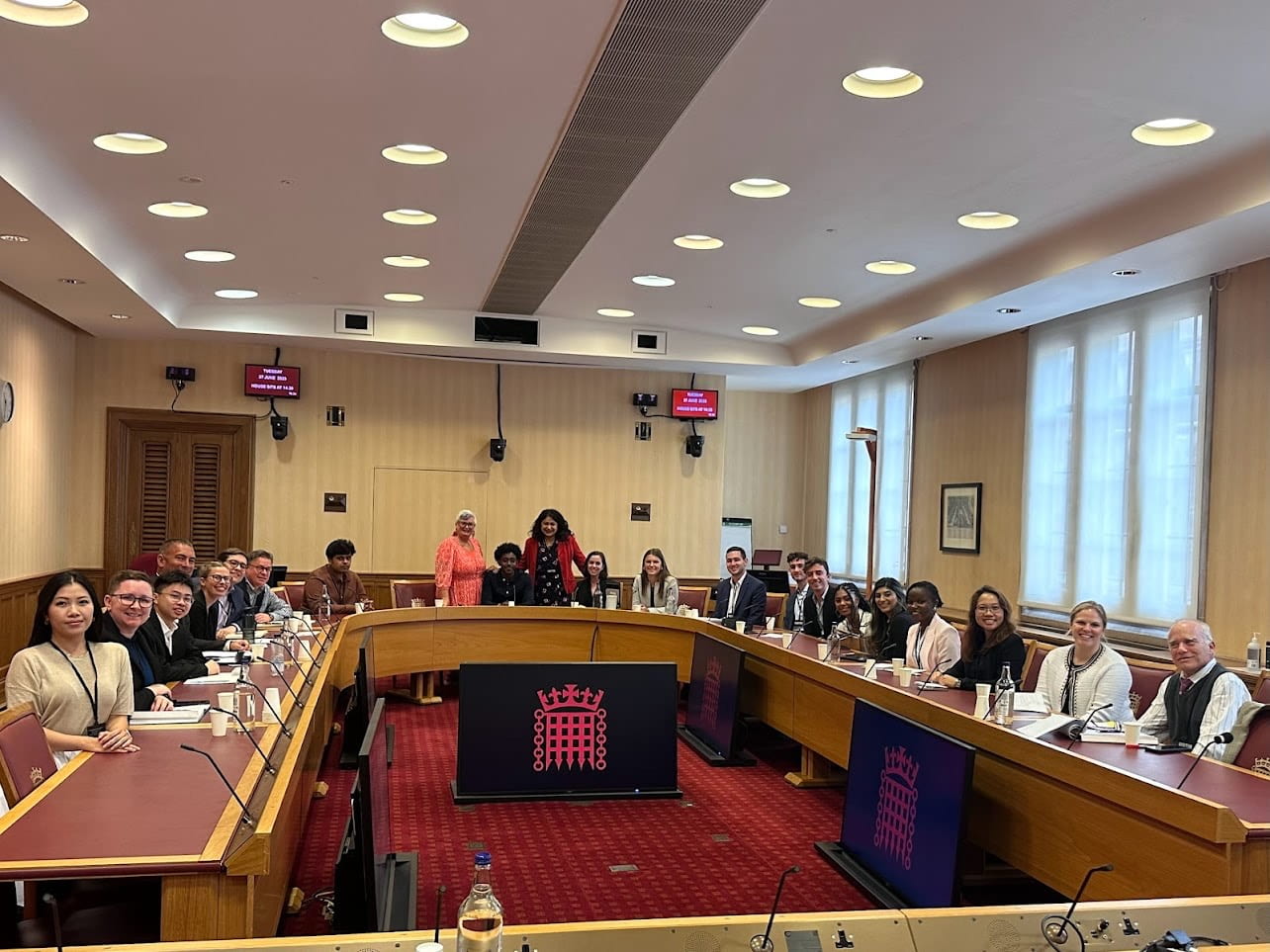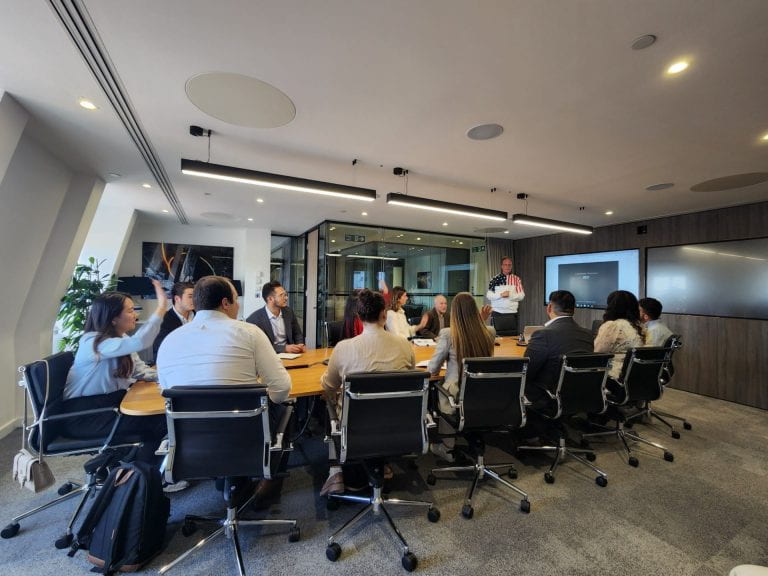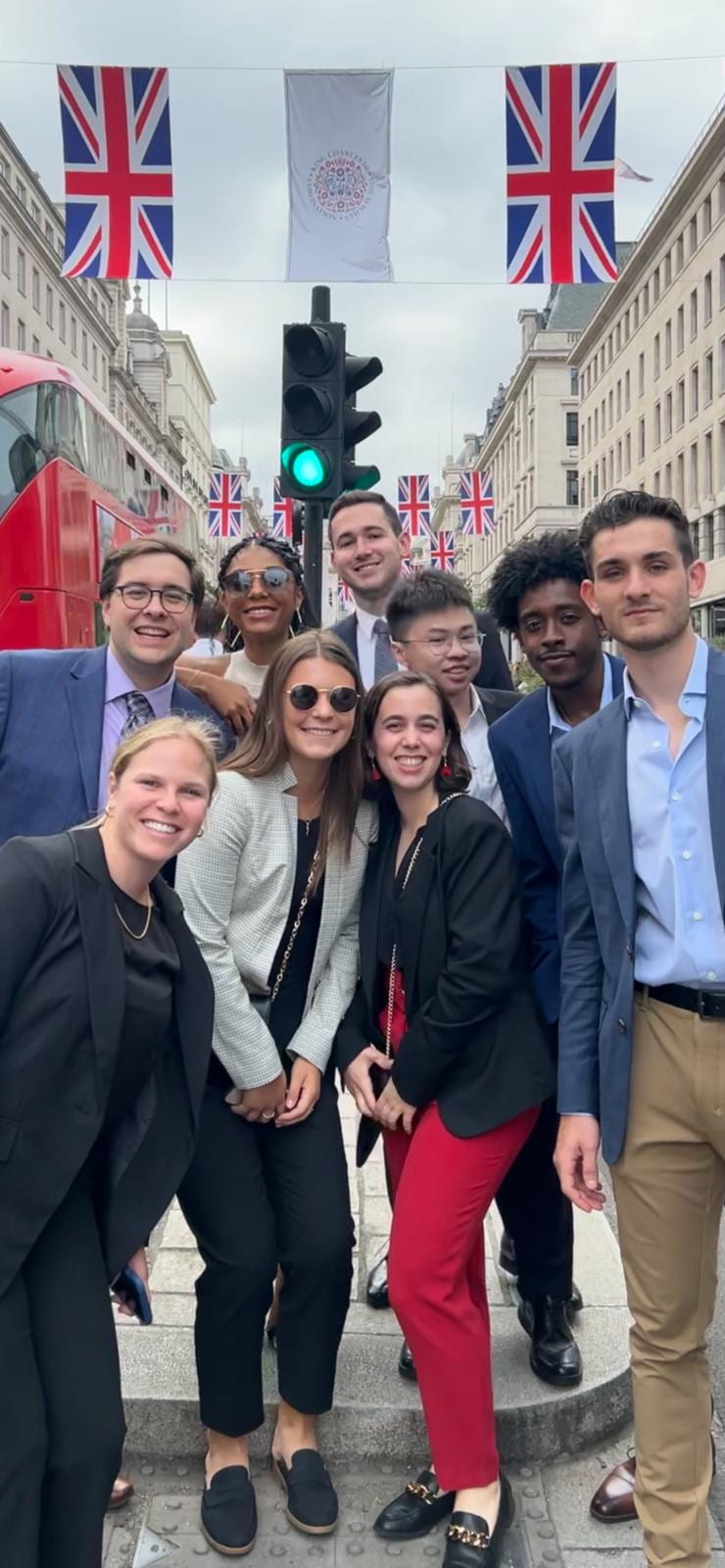By Mukhammadjon Ataev (MSIB)
Featured above: STAP UK participants in front of Winchester Cathedral.
My motivation for participating in the Business and the State program was to learn more about privatizations and PPPs, as I am planning to build my career in the sphere of consulting. As a consultant, I will need to gain as much knowledge as possible about business operations, ownership, business ties to government, and trends in the field. This course helped me deep dive into the privatization process, the milestones that occur in privatization, PPPs, and success factors impacting privatization.
Learning about privatization and PPPs in the context of the UK was a great idea. This country has gone through a huge privatization program and their journey in the establishment of PPPs is very useful to learn about best practices, as well as State and Business relationships. Even though I support privatization, throughout the course I could see that privatizations are useful not only for development purposes, but also as a powerful tool in politics since they can be used by politicians to gain votes and improve their image.
Featured in right image: the author in front of the Thames River and the Houses of Parliament in London.

The program was very interesting, because it was organized with speakers from different backgrounds and industries that showcased privatization from various perspectives. I especially enjoyed that the course allowed us to apply our knowledge in different industries and political viewpoints. I was also excited that speakers were not just from academia, but were professionals in different spheres, sharing their point of view and knowledge based on their own experience. As I believe that theories always should be tested in practice, it was great to have a mix of theoretical and experience-based knowledge.
Privatization of Public Utilities and Alumni Reception

Featured in the above image: STAP UK participants at the Royal Automobile Club in London.
Meeting with Cat Hobbs from “We Own It” was very interesting and gave another perspective on the privatization process. A lot of public utilities’ privatizations have taken place throughout history— some of which were successful, while others were not. In the case of water privatization in the UK, the matter was neither one nor the other. Compared to the Argentinian fall in privatizing its water system, the UK hasn’t run into any problems during the process, as their currency was stable and the process went smoothly. However, we can see that long-term issues might appear.
One contributing factor to this possibility is public opinion. The main concerns of the public currently are the quality of the water in the rivers and increasing prices. From the business perspective, the improvement of water quality needs additional investment. While this action will lead to increased prices, it is also an important factor for the public. Now the UK is in a difficult position where actions are needed, but each mistake could cost billions of dollars. As a result, this issue has become a powerful tool in the hands of politicians who can manipulate the issue to gain votes.
This lecture was also very helpful for me on a personal level, since my home country is currently undergoing huge reforms and liberalization. The government of my country started the privatization of state-owned enterprises a few years ago and we are now at a point where the privatization of public utilities is a heavily contested issue. In this way, our talk with Cat Hobbs of “We Own It” was enlightening. Her lecture taught me a lot of the considerations that my country could learn from in our own debates back home.
After the lecture, we attended a GW Alumni reception at the Royal Automobile Club. This was a great opportunity to meet with alumni and learn about their journey after graduation. I was especially fascinated by their differences in career development post-graduation.

Featured in the above image: STAP UK participants at the GWSB Alumni Reception in London.
It was wonderful to see how they were able to succeed in a very competitive job market, but still have time to gather and promote GW abroad. During the reception, I was able to talk with many people with fascinating backgrounds. One highlight of the evening was talking to an alum with expertise in my field— they even agreed that we should collaborate together in the future.
PPP’s in the Sphere of Defense
When I hear “privatization” or “PPP,” I mostly think of state-owned companies such as airlines, railways, and national enterprises. However, in the case of the British Army Logistic Corps, I learned how even defense can be established in the form of PPP. It was interesting to learn from someone who worked during these reforms and could speak to how they took place, as well as how the UK did it back in the 90’s. This came to be one of the most valuable lectures we attended because it was a totally different perspective from my own and was delivered by the firsthand source.

When I hear “privatization” or “PPP,” I mostly think of state-owned companies such as airlines, railways, and national enterprises. However, in the case of the British Army Logistic Corps, I learned how even defense can be established in the form of PPP. It was interesting to learn from someone who worked during these reforms and could speak to how they took place, as well as how the UK did it back in the 90’s. This came to be one of the most valuable lectures we attended because it was a totally different perspective from my own and was delivered by the firsthand source.
Featured in image to the left: the Royal Logistics Corp Museum.
During this lecture, we learned that contracting the defense is a great saving opportunity for the government. Innovations in industry can have an impact on other spheres. As a result, the government may soon get the latest technological solutions if it contracts with private companies. While I learned a lot during this session, I was also left with some new questions of my own—namely, how safe is it to contract the defense sphere when taking national security and potential dependence on private companies into consideration?
In addition to the British Army Logistic Corps, I loved the city of Winchester and our tour around town. Being there, I could feel the atmosphere of history, royalty, and richness of the U.K. Learning more about the history of churches in the country and its place in politics was interesting to me. In the end, I left Winchester feeling that it was even more emblematic of Great Britain than London. The architecture and history in this beautiful city were second to none.
Featured in right image: Winchester Cathedral.

Conclusion
Overall, I loved this course because of the mix of theoretical and experience-based knowledge. By combining these two, I was able to see a lot of similarities between practice and theory. This was useful in learning best practices, while also recognizing that some industries face difficulties in privatizing. One of the most notable difficulties in implementing privatization is balancing it with public opinion and the influence of politics.

Another great aspect of the program was the cohort of classmates taking the course. Our cohort consisted of students from different majors, as well as professional backgrounds. It was nice to hear their perspectives on the subject matter and learn more about their careers. Our group was full of curious people who asked a wide range of questions according to their perspectives. This helped me to look at each issue from different angles and enriched our course discussions.
Finally, I was surprised by how people care about politics in the UK and how they stand for their viewpoints. They enjoy sharing and defending their ideas, which leads to interesting political discussions. In particular, I loved the meeting with Lord Kinnock to hear his point of view on current political trends and learn more about his career as he went through the long journey of being from a worker's family to achieving the status of a Lord. I was inspired by his story, straightforwardness, and character, proving that there is no limitation if a person works hard and believes in their ideas.
Featured in the left image: the author posing with Lord Neil Kinnock.
Last, but not least, I want to thank G&EE for working with Prof Weiner and our TA Holly for organizing such an informative and well-established course. As this was my second STAP, I wanted to express my sincere gratitude for the G&EE team (especially, for Olivia and Marie) for their great work that has been done behind the scenes, as well as their support during my visa application processes.

Featured above: students touring the Winchester Cathedral.

Featured above: the author posing with guest speaker, Lt. Col. Edward Waite-Roberts.

Featured above: the Houses of Parliament and Elizabeth Tower over the Thames River.






